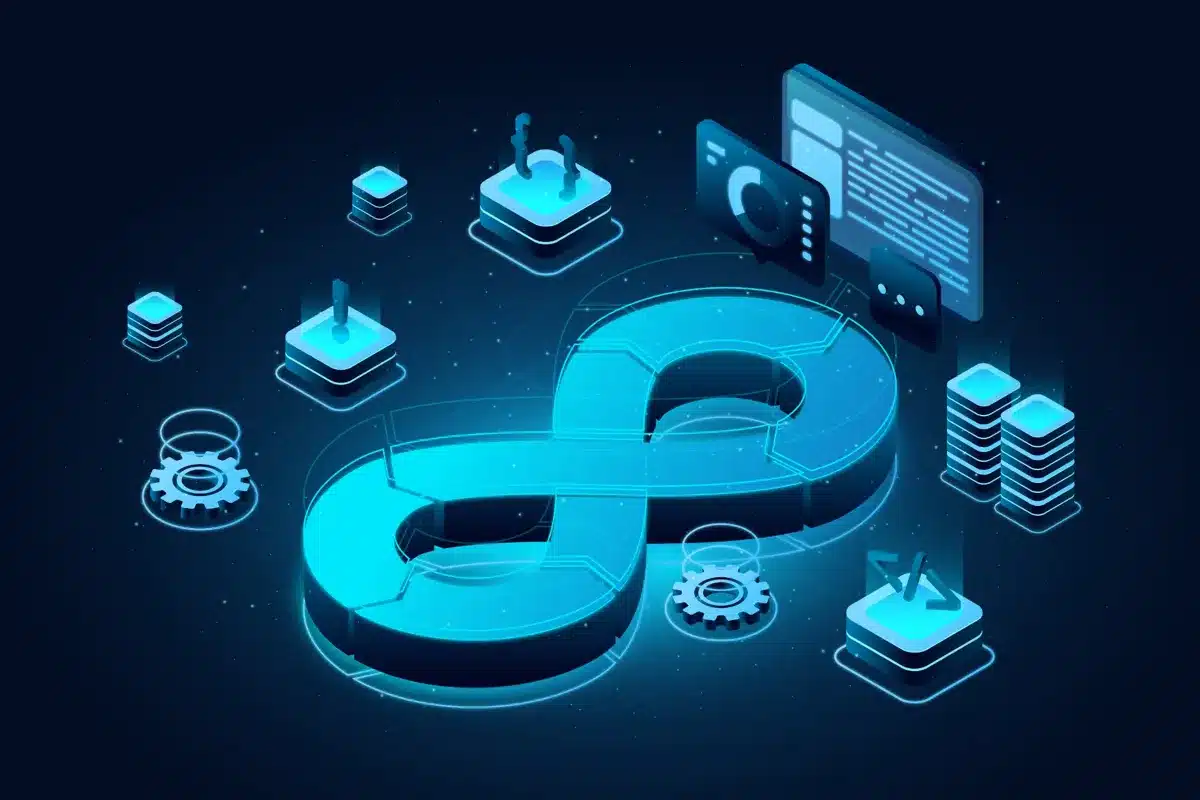The integration of AI in DevOps is revolutionizing software engineering automation by enabling intelligent pipelines, predictive analytics, and seamless CI/CD automation. These advances accelerate software delivery, enhance quality, and drive the evolution of DevOps into a more adaptive and resilient discipline. The rise of machine learning in DevOps and MLOps marks a pivotal shift toward fully AI-powered software lifecycle management.
Introduction: Embracing the AI-Driven DevOps Revolution
In today’s fast-paced technology landscape, organizations face intense pressure to release software faster while maintaining high quality and reliability. AI-powered automation embedded throughout the DevOps lifecycle is transforming how software is engineered, tested, deployed, and maintained. This fusion of AI and DevOps reduces manual toil, anticipates system failures, and optimizes resource use — essential to meeting modern software demands. Beyond automation, emerging AI paradigms such as Agentic AI—which empowers systems to autonomously make decisions—and Generative AI—which can create code, tests, and documentation—are beginning to redefine DevOps workflows. Together, these technologies enable truly intelligent pipelines that continuously learn and adapt.
Background: The Evolution of DevOps Through AI
DevOps originally emerged to bridge development and operations with practices like continuous integration and continuous delivery (CI/CD) to accelerate deployment. While automation of repetitive tasks and cultural collaboration were core, persistent challenges such as technical debt, slow incident response, and inefficient resource use remained. AI integration addresses these challenges by:
- Leveraging machine learning in DevOps to analyze historical and real-time data, predicting failures before they occur.
- Automating complex workflows beyond simple scripting, reducing human error and manual effort.
- Enhancing security via AI-driven vulnerability detection in DevSecOps.
- Dynamically optimizing resource allocation based on workload trends and predictive insights.
The market for AI in DevOps is expanding rapidly, projected to grow from $2.9 billion in 2023 to nearly $25 billion by 2033, driven by AI’s ability to accelerate delivery and improve operational excellence.
Latest Features, Tools, and Trends in AI-Driven DevOps
AI-Powered CI/CD Automation
AI-enhanced CI/CD pipelines automate the entire software delivery lifecycle—from code commits to deployment—with greater speed and precision. Tools such as GitHub Copilot, Jenkins AI plugins, and GitLab AI assist in code writing, automated testing, and deployment, reducing errors and accelerating release cadence.
Intelligent Monitoring and Anomaly Detection
AI-based monitoring platforms like Dynatrace and Harness employ machine learning models to detect anomalies in application performance, resource consumption, and user behavior. These tools deliver real-time root cause analysis and predictive alerts, enabling rapid remediation and minimizing downtime.
AI-Enhanced Security (DevSecOps)
Security is strengthened through continuous AI-driven scanning of code and infrastructure to identify vulnerabilities early. Solutions such as Snyk AI, Palo Alto Prisma Cloud, and Darktrace proactively identify and mitigate cyber threats within DevOps workflows.
Infrastructure as Code (IaC) with AI Automation
AI-powered IaC tools like Terraform AI, Pulumi AI, and Ansible AI integrations automate infrastructure provisioning and optimize cloud resource configurations, enhancing scalability and resilience.
Advanced Tactics for Success with AI in DevOps
- Predictive Analytics for Proactive Operations: Use AI models to forecast system failures and performance bottlenecks by analyzing telemetry and historical data, enabling preemptive fixes.
- Automated Incident Response: Deploy AI-driven incident management systems that detect and resolve issues in real time, reducing mean time to recovery (MTTR).
- Code Quality Automation: Integrate AI-based static analysis and security scanning tools within CI/CD pipelines to maintain high code quality and minimize technical debt.
- Dynamic Resource Optimization: Employ AI to allocate cloud and compute resources dynamically based on real-time workload patterns, improving cost efficiency.
- Fostering Collaboration: Leverage AI insights to bridge communication gaps between development and operations teams, enhancing transparency and decision-making.
The Role of Agentic AI and Generative AI in DevOps
Agentic AI enables systems to autonomously execute complex tasks such as triaging incidents or generating deployment plans, reducing human intervention. Generative AI supports developers by creating code snippets, test cases, and documentation, accelerating development cycles and improving accuracy. These emerging AI capabilities are integral to the future of software engineering automation, powering DevOps pipelines that learn, adapt, and optimize continuously.
Measuring Success: Analytics and Insights in AI-Driven DevOps
Organizations adopting AI-driven DevOps report measurable improvements including:
- Reduced deployment failures and rollback rates
- Faster mean time to detection (MTTD) and mean time to recovery (MTTR)
- Increased deployment frequency and shorter lead times
- Improved resource utilization and cost savings
- Enhanced security posture with fewer vulnerabilities
These metrics demonstrate the tangible benefits of intelligent automation and predictive operations.
Business Case Study: Netflix’s AI-Driven DevOps Transformation
Netflix, a global streaming leader, faces the challenge of managing complex microservices with rapid deployment demands while ensuring uptime and performance. Their AI-driven DevOps tactics include:
- Implementing AI-based anomaly detection tools for real-time service health monitoring
- Automating CI/CD pipelines with AI-enhanced testing and deployment
- Leveraging AI for predictive resource scaling to handle traffic spikes dynamically
Results:
- Deployment frequency increased by over 50%
- Significant reduction in downtime incidents
- Enhanced user experience through proactive issue resolution
Netflix exemplifies how AI in DevOps can scale software delivery efficiently at global levels.
Actionable Tips for Software Engineers and Marketers
- Adopt AI-driven CI/CD tools early to reduce manual errors and accelerate releases.
- Integrate AI monitoring and anomaly detection to identify issues before they impact users.
- Invest in AI-powered security scanning to embed security throughout development.
- Leverage AI for infrastructure automation to optimize costs and scale efficiently.
- Commit to continuous learning through courses combining theory, hands-on projects, and industry internships.
Why Choose Amquest for Mastering AI in DevOps?
Amquest’s Software Engineering, Agentic AI and Generative AI course offers an unmatched blend of:
- AI-led modules delivering deep, practical insights on integrating AI with DevOps automation
- Hands-on learning via real-world projects and internships with leading industry partners in Mumbai and nationwide online access
- Faculty comprised of seasoned industry experts and researchers providing mentorship and cutting-edge knowledge
- Comprehensive curriculum covering machine learning in DevOps, intelligent pipelines, CI/CD automation, and MLOps aligned with evolving market needs
- Proven track record of student placements and success stories in AI-driven software engineering roles
This holistic, industry-connected, and practice-oriented learning experience equips professionals to lead the future of AI-powered software engineering automation.
Conclusion
The future of software engineering automation is inseparable from AI in DevOps. Intelligent pipelines, predictive analytics, and automated CI/CD processes are essential for competitive advantage. Professionals fluent in AI and DevOps will drive this transformation. Amquest’s comprehensive course in Software Engineering, Agentic AI and Generative AI is the optimal choice for mastering this future. With expert faculty, AI-powered learning, and industry internships based in Mumbai and nationwide, Amquest prepares you to excel in the evolving software engineering landscape. Take the next step in your career by enrolling now and mastering the future of DevOps automation with AI. Enroll in Amquest’s Software Engineering, Agentic AI and Generative AI course today.
FAQs
Q1: How does AI improve CI/CD automation in DevOps?
AI automates code testing, deployment, and monitoring within CI/CD pipelines. It predicts failures, suggests smart test cases, and accelerates delivery with fewer errors, making pipelines more intelligent and reliable.
Q2: What role does machine learning play in DevOps?
Machine learning analyzes historical and real-time data to detect anomalies, predict outages, optimize resources, and automate incident response, enhancing software reliability and efficiency.
Q3: How can AI-powered monitoring tools benefit DevOps teams?
These tools provide real-time anomaly detection, root cause analysis, and predictive alerts, enabling teams to resolve issues quickly and reduce downtime.
Q4: What is the significance of MLOps in AI-driven DevOps?
MLOps integrates machine learning lifecycle management into DevOps, enabling continuous training, deployment, and monitoring of AI models to keep them accurate and effective.
Q5: How does AI enhance security in DevOps workflows?
AI-powered security tools continuously scan code and infrastructure for vulnerabilities, detect threats early, and automate remediation, embedding security seamlessly into DevOps pipelines.
Q6: Why is Amquest’s course recommended for learning AI in DevOps?
Amquest offers AI-led modules, hands-on projects, industry internships, expert faculty, and strong Mumbai and national presence, providing a comprehensive, practice-oriented learning path designed for career success in AI-powered software engineering automation.







